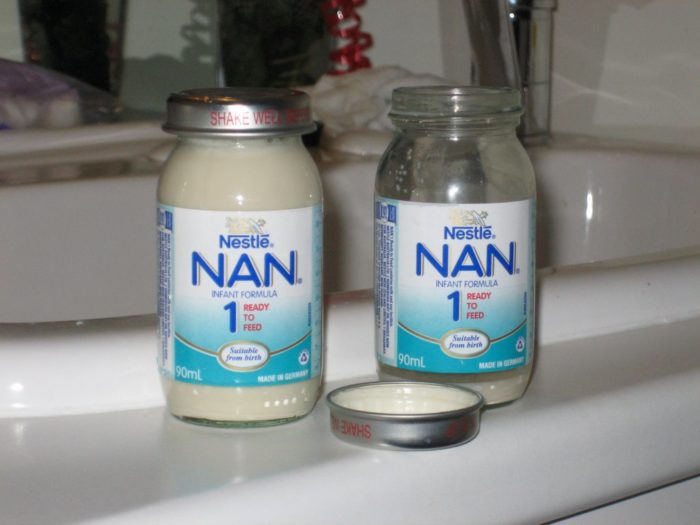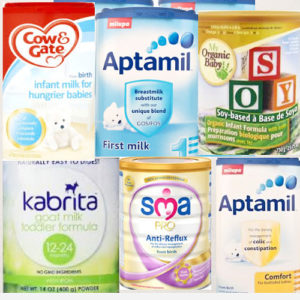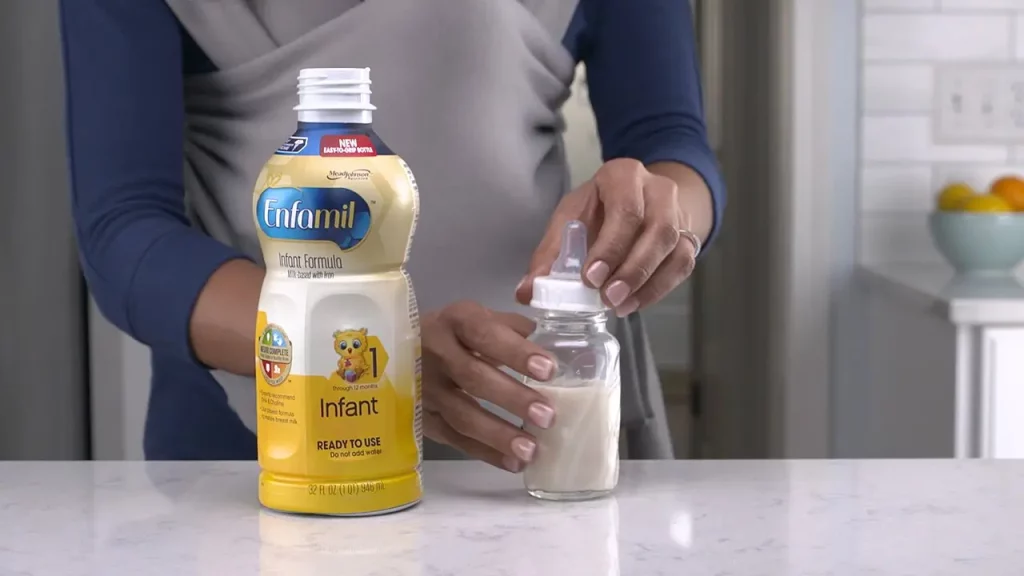The task of selecting the optimal formula for your little one can be a bewildering experience, fraught with numerous perplexing factors. One key consideration is whether or not your baby has any allergies or sensitivities that necessitate a specific type of formula. In such cases, seeking guidance from your pediatrician is crucial in making an informed decision and identifying the finest baby formulas by 2023 to cater to your child’s unique needs.

Another vital factor to bear in mind is the composition of baby formula that you prefer. You may opt for liquid, powdered, or ready-to-feed varieties depending on what suits you best. While ready-to-feed options offer convenience at a premium price tag, powdered variants are more economical but require additional preparation time.
In addition, organic baby formula constitutes another alternative worth contemplating if you’re willing to shell out more money for superior quality ingredients and production methodologies. However, it’s important to note that just because something bears an organic label doesn’t necessarily mean it’s superior or safer than non-organic choices when it comes to your child’s well-being.
Ultimately, before deciding on which formulation will nourish your offspring most effectively, consult with their pediatrician and meticulously evaluate all relevant factors. Additionally, delving into frequently asked questions about feeding babies different types of formulas currently available on the market could also prove illuminating and beneficial for concerned parents like yourself.
Understanding the Different Types of Baby Formula: Liquid, Powdered, and Ready-to-Feed
Infant formula – a perplexing topic, indeed. Amidst the flurry of choices available to parents, three main forms of baby formula reign supreme: liquid, powdered, and ready-to-feed. Of course, as with anything in life, each type has its own unique set of pros and cons.

Liquid infant formula is undoubtedly the most expensive option on the market. However, for time-strapped parents who simply cannot be bothered to mix powder with water – it can be a godsend. Powdered formulas are more affordable than their liquid counterparts but require preparation before use; mixing the powder with water can feel like an arduous task at times.
Lastly – we have ready-to-feed formulas – the epitome of convenience in our fast-paced world. They don’t require any preparation or mixing whatsoever; you just pour them into a bottle and voila! Your baby’s next meal is served. Admittedly though they tend to be pricier than powdered formulas- some parents find them worth every penny for their sheer convenience alone.
It’s crucial to note that no single type of formula is inherently superior to another- it all boils down to what works best for you and your little one’s needs. When embarking on this daunting quest (because let’s face it- choosing baby formula IS overwhelming) consider factors such as whether your child has a milk protein allergy or if breast milk could still remain an option…
Organic Baby Formula: Is It Worth the Extra Cost?
The question of whether or not to shell out extra cash for organic baby formula can be a perplexing one. On the one hand, these formulas are made with ingredients that haven’t been marinated in harmful pesticides and chemicals. And some studies suggest they’re more similar to the nutrient content found in breast milk.
But hold your horses! Don’t forget that all infant formulas – regardless of their pedigree – have to pass muster with strict nutrition guidelines laid down by the FDA. So it’s not like choosing non-organic will leave your little one malnourished and stunted.
At the end of the day, whether or not you decide on an organic option is going to depend on how tightly you clutch onto personal preferences (and purse strings!). It’s worth noting that ready-to-feed varieties tend to burst forth from wallets more forcefully than powdered ones do – but they also offer convenience because there’s no measuring required.
If cost is a concern but you still want an organic option, talk turkey with your pediatrician about which type might be best for both baby…and budget.
Milk Protein Allergies in Infants: Choosing the Right Formula
Navigating milk protein allergies in infants can prove to be a perplexing challenge for even the most seasoned of parents. Should your precious little one exhibit an allergy towards cow’s milk proteins found within formula, you’ll need to seek out alternative options that omit this ingredient altogether. One such option is powdered formula, which offers up the convenience of being mixed with water and prepared at home.
For those whose preferences lean towards organic choices, rest assured that there are formulas available for babies with milk protein allergies that come from cows fed solely on organic feed free from antibiotics or hormones. These formulas also boast vital vitamins and minerals necessary for proper growth and development.
It should be noted that the American Academy of Pediatrics recommends choosing pre-made baby formula as it mitigates any risk of contamination during preparation. However, if you do select powdered formula instead, ensure precise adherence to package instructions while utilizing only sterilized bottles and nipples for feeding purposes. Opting for iron-rich formulas can also prove beneficial given its critical role in your child’s overall health.
Remember to always confer with your pediatrician when determining which type of baby formula would best address your child’s particular needs amidst milk protein allergies in infants. Their guidance regarding how much formula should be administered based upon age, weight, and other individual factors will provide invaluable insight into ensuring proper nutrition without any accompanying allergens present.
Top Baby Formula Brands in the US: An Overview
The market is awash with various options for infant formula, each boasting of its unique benefits. From liquid to powdered and ready-to-feed formulas, all offer excellent nutrition for your little one’s growth and development. But as a parent, how do you choose the best option?
As concerns about pesticides and other harmful chemicals found in non-organic foods continue to rise, many parents opt for organic ingredients. And indeed, some formula brands have jumped on this bandwagon by offering organic options that claim to be free from these hazardous substances. Moreover, certain formulas come packed with ingredients like those found in breast milk or human milk – touted to boost brain and eye development.
For infants who are allergic or intolerant to cow’s milk protein (a common issue), partially hydrolyzed formula has been recommended by experts as an alternative solution. This type of formulation breaks down proteins into smaller pieces that are easier on baby’s digestive system – but let us not forget that consulting a pediatrician before switching is paramount!
Formula Feeding FAQs: Common Questions and Concerns Answered by Pediatricians
The quandary of selecting the optimal formula for your infant is multifaceted. There are a plethora of variables to take into account, such as whether or not your child has an allergy to milk protein and necessitates a soy-based formula, or if they thrive on a dairy-based one. It’s critical to seek advice from a pediatrician before making any decisions regarding which type of formula to utilize.
Many formulas are crafted meticulously with premium ingredients that can bolster your baby’s growth and development. Nevertheless, some parents may be inclined towards pricier options or organic alternatives. Despite their allure, these choices may not be obligatory for every household.
A common anxiety among parents is whether their offspring are receiving sufficient sustenance from the formula they’re being given. Pediatricians advocate adhering to feeding guidelines while keeping tabs on weight gain and overall health in order to guarantee that infants remain contented and healthy whilst utilizing the chosen variety of formula.
Powder Formula: Pros and Cons
The bewilderment surrounding infant formula never seems to dissipate. Choosing the right one can be a head-scratching endeavor for parents, but powder formula seems to tick all the boxes. Its convenience and storage capabilities make it an attractive option for many caretakers. Not to mention its affordability compared to ready-to-feed formulas. To top it off, powdered formulas are purportedly easier on babies’ tummies than their liquid counterparts.
Some varieties of formula boast being “close to breast milk” due to the inclusion of human milk oligosaccharides (HMOs). These prebiotics present in breast milk tend to bolster a baby’s immune system and are found in these specialized formulas as well. In addition, they also contain essential vitamins and minerals vital for your little one’s growth such as calcium, iron, and vitamin D.
But alas! There is always something lurking beneath the surface that complicates matters – some infants may struggle with specific ingredients like cow’s milk protein found in certain types of formula. If you suspect your baby has an allergy or intolerance towards this ingredient or any other component within typical brands on the market, consulting with your pediatrician about alternative options would be prudent. Luckily, there are female-founded and mom-led companies providing choices beyond conventional products available today!
Female-Founded and Mom-Led Infant Formula Companies: A New Trend in Formula Options.
Amidst the quest for an optimal formula to nourish their infants, a novel trend has surfaced of late. One that is characterized by infant formula companies founded and led by women who also happen to be mothers themselves. These avant-garde enterprises strive to offer formulas that emulate breast milk and are tailored specifically for babies aged 0-12 months.
Organic ingredients constitute a fundamental component in many of these formulations, which also contain all the essential nutrients required by newborns. Moreover, such brands provide both liquid and powder forms so that parents can opt for what suits them best. Some even cater to infants with delicate stomachs by presenting milk or soy-based alternatives.
It’s worth noting though, that unlike FDA-endorsed formulas marketed in the U.S., these innovative options may not have received official approval from regulatory authorities. Nevertheless, experts well-versed in what’s ideal for fledglings meticulously design them with care and consideration at heart. Therefore, it behooves parents always to conduct thorough research before settling on any given formula – whether from established firms or emerging contenders like those discussed herein.

